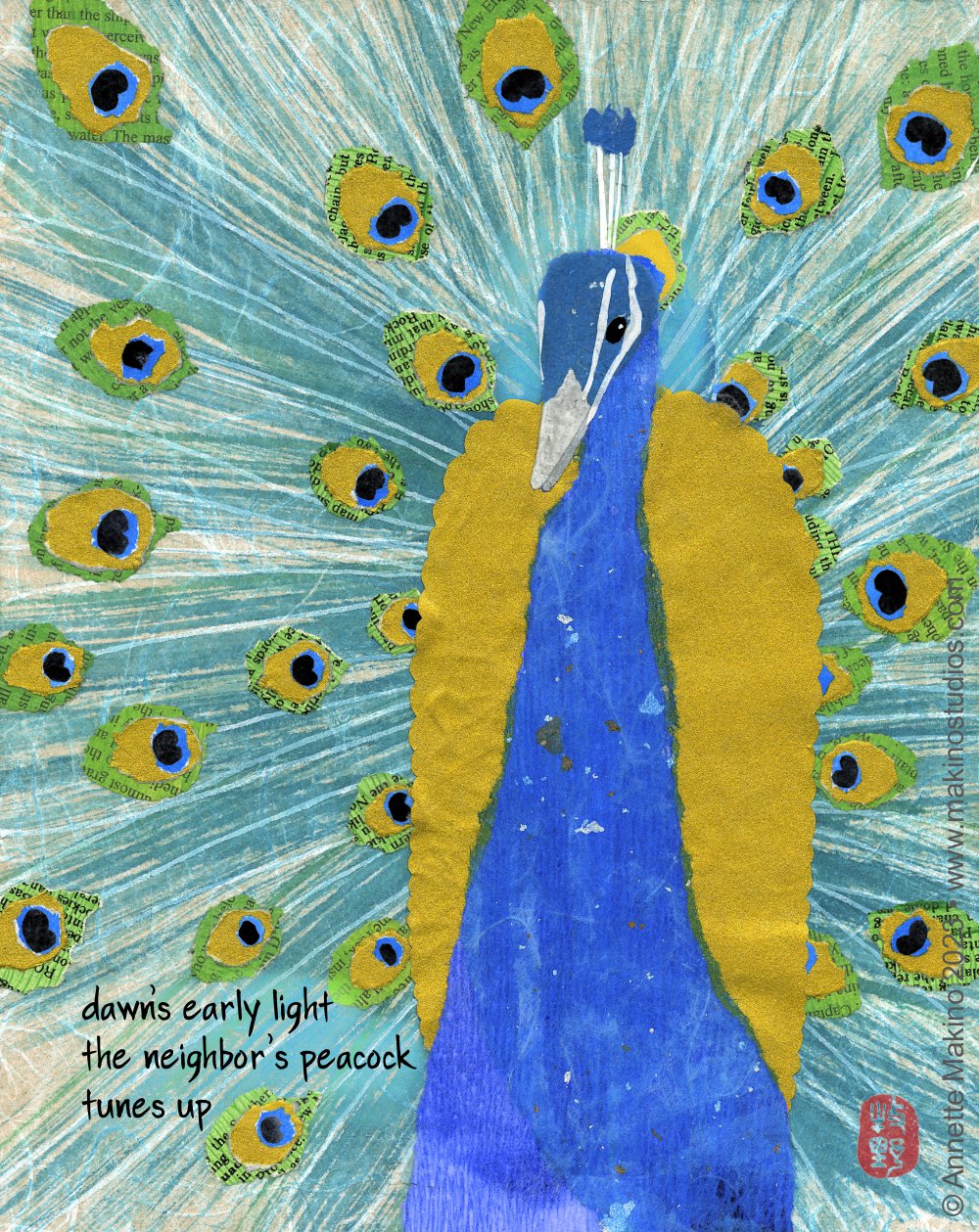“dawn’s early light” is 8x10, made from Japanese washi papers, metallic gold paper, book pages, paint and glue on cradled wood panel. It is the February art for my 2024 calendar. A card version reads, “you light up the room.” © Annette Makino 2023
I must admit I ignored Taylor Swift for years, thinking a pop star with such mainstream popularity, a pretty blonde beloved by teenage girls, would not be my cup of tea. But with the 2020 release of her folk-pop album Folklore, I took another listen—and became a fan. I belatedly discovered she is a gifted songwriter who writes original and interesting lyrics.
As you’ve probably heard, Swift has announced a new album called The Tortured Poets Department, to be released April 19. So does Swift consider herself a tortured poet? As evidence, there is a hand-written poem she recently posted to Instagram that includes lines like “my muses, acquired like bruises” and “my veins of pitch black ink.” Another subtle clue: it’s signed “The Chairman of the Tortured Poets Department.”
And yes, her lyrics often convey suffering. In “All Too Well” she sings, “you call me up again/Just to break me like a promise/So casually cruel in the name of being honest.” And on “Cardigan” she sings, “You drew stars around my scars/But now I’m bleeding.”
But the pain she describes is just one element of her persona; other songs talk about falling in love or tell colorful stories about fictional characters. I suspect Swift’s use of the “tortured poets” label is at least partly tongue-in-cheek, offered with her trademark combination of confession and self-deprecating humor. I guess we Swifties will just have to wait until April 19 for further clarity on this burning issue!
Meanwhile, the album title raises the question: do poets need to be tortured to write good poetry? The poster child for this stereotype is Sylvia Plath, a brilliant poet of pain and despair who took her own life at age 30. For awhile I found that my darker haiku had higher acceptance rates than my neutral or upbeat poems—proof that such poems are inherently stronger or more compelling? (See my anonymous 2013 letter on this question to the Haiku Maven advice column.) But of course, one can write about hard times from a place of acceptance rather than agony.
Despite the trope of the tortured poet—a corollary to the trope of the starving artist—there are plenty of life-affirming poets. Consider Mary Oliver’s lines, “When it’s over, I want to say: all my life/I was a bride married to amazement.” Maybe it comes from spending a lot of time in nature and learning to notice small details, but haiku poets in particular really seem to appreciate life’s gifts.
“scattered feathers” is 5x7, made of watercolor paper, an airmail envelope, washi paper, a vintage Janaese stamp, feathers, paint, thread, ink and glue on paper. © Annette Makino 2021
Tortured or not, I think the most effective poems come from being present and attuned to the world around you. You don’t necessarily have to suffer to write good poetry, but you do need access to depths of feeling and the gift of observation. This helps you write poetry that is accessible, involving some experience readers can relate to even if they have never gone through that exact event. An example:
dawn’s early light
the neighbor’s peacock
tunes up
Poetry—and I include Taylor Swift’s lyrics in that category—helps us make sense of this shifting world, the major triumphs and tortures along with the small moments that, strung together, make up our lives.
scattered feathers
the weight
of being human
•
Makino Studios News
Red Moon Anthology: I am thrilled to have the following poem in Upside Down, the 2023 anthology from Red Moon Press of the best English-language haiku of the year. Editors nominated more than 3000 poems for the latest edition, and I’m honored that mine was one of the 146 haiku that made the cut. My thanks to the anthology editors.
alone at the beach
someone else’s dog
brings me a stick
Mother’s Day and graduation: I’ve stocked up on these cards for Mother’s Day (May 12) and graduation (Cal Poly Humboldt commencement is May 11). Browse all 70-odd card designs.
•
Publication credits:
“dawn’s early light” - Mariposa; “scattered feathers” - Modern Haiku.



